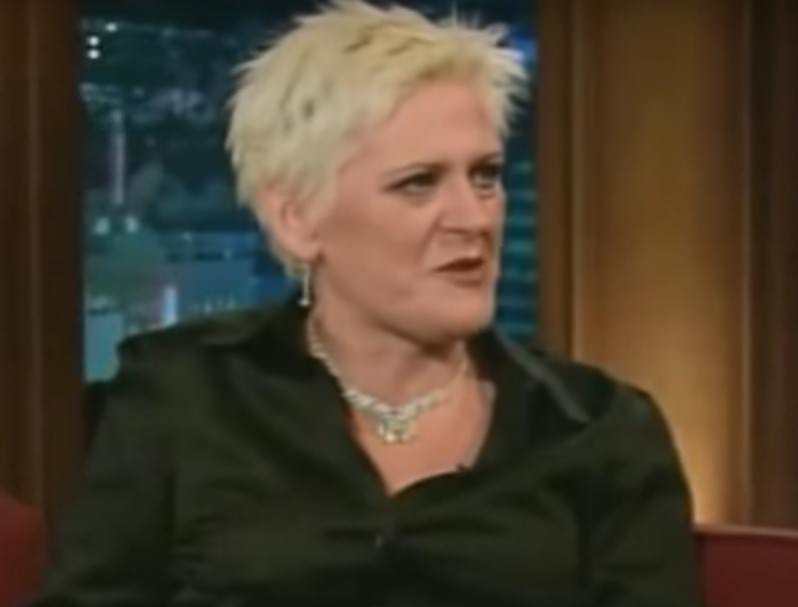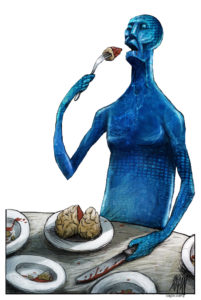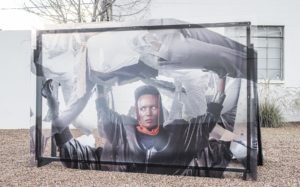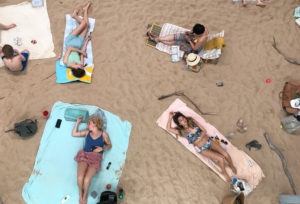Writer and Actress Lynn Ferguson on the Art—and Power—of Storytelling
The sister of comedian Craig Ferguson is a versatile performer, whether she’s doing stand-up, improv or a "Moth Radio Hour" story. She also teaches others how to tell stories and master their craft.
Lynn Ferguson. (bgrhubarb / YouTube)
If witty banter were a sport, Lynn Ferguson would be an Olympic gold medalist. Whether she’s doing stand-up, improv, or a Moth story, Ferguson employs something akin to a verbal bump-set-spike maneuver. Her Scottish lilt allures while her humor mesmerizes, but when Ferguson delivers her spike, it isn’t meant to destroy. It might sting but only because it will be sharpened by insight.
A graduate of the Royal Scottish Academy of Music and Drama, Ferguson also has been a regular contributor to the Edinburgh Fringe Festival, where eight of her plays have been produced and where she garnered a Fringe First Award from The Scotsman, Scotland’s national newspaper. She has written and performed for BBC Radio, BBC television and The Moth. Fans of The Moth Radio Hour might be interested to know that Ferguson coaches writer/performers at all levels in the art of storytelling.
As an actress, Ferguson played the voice of Mac in “Chicken Run.” Later she contributed to the script for the movie “Brave.” Ferguson is skilled in improv, and she has written for “The Late Late Show with Craig Ferguson,” who happens to be her brother. She has also appeared on the show as a guest.
Eileen Cronin:I love this clip with Craig and John Waters. What was it like being a writer for “The Late Late Show with Craig Ferguson”?Lynn Ferguson:
It was quite a discipline. I came from the UK [United Kingdom] where there are no writing teams. I’d written plays, three series of sitcom in television, all on my own. Then I was in a room with a bunch of guys, and my job was to configure the right jigsaw piece on any given day. We wrote five shows a week, and what went out at night, we mostly started working on around 9:30 a.m. There was no “I can’t do it.” It was tough, but it has given me a relentlessness that I may not have learned otherwise.
EC: How is your storytelling class different/alike from stand-up or improv? Is it useful to writers or comedians?
LF: Stand-up is about learning to dominate the stage with your personality: You are the voice in the room. You make the rules. The comic speaks, the audience responds.
In story, you don’t have to dominate, you can learn to play with the emotions. Everything doesn’t have the quick reward of a laugh. It’s interesting. At stand-up events, you know how well it’s going by the sound of the laugh. At story events, you know by the weight of the silence.
For writers, they are continually taking something and confining it in a structure. The nature of writing is: What are you writing? What is the form? What genre is it? But live storytelling isn’t the same as written storytelling. You don’t have to choose the genre before you’re allowed to speak. We all have within ourselves an element of horror or love or comedy. The tone of the story is dictated by the way you see it, not by any given form. Also, a live person is not the same as a blank sheet of paper. We each have a sound, a way we look, a rhythm in the way we speak. You can give the same story to two different people and it will sound different.
Improv is built on the concept of “Yes.” Its nature is exciting because of its uncertainty. The relationship between audience and improvisor is that they are building together. In story, the audience listens as the teller paints the picture. They are not co-creating the picture, but they get to see it close up.
EC: Tell me how you got into The Moth. By the way, I love your Moth story.
LF: A friend of mine, brilliant storyteller and fantastic playwright, Kemp Powers, had just done a slam and, on the back of it, had been invited to tell his story at Moth main stages. We had told stories at a couple of events together in the past, and he suggested to me that I should try out a slam. I didn’t win the slam and thought nothing of it. Then I got an email asking if I was available to do the main stage in New York.
EC: And that is the way The Moth works. As soon as you think they don’t want your story, they invite you to the main stage. As for your storytelling class, I know that it involves the selection and refining of a story, and that you work with students in developing and telling their story. What happens at the end of the class?
LF: Class 5 [the fifth class session] is the live story event. We generally sell out, and the atmosphere is amazing. It’s part performance/part family/part confessional. It’s a little bittersweet for me. There’s nothing like watching the expression on a storyteller’s face when they realize what they’ve just done, but I’m always a little sad that the group will disband. Most people come back to the graduate class so I see them again, but there’s something electric about when someone finally understands their own power.
EC: What is the takeaway for the graduates from your class?
LF: I’ve had all manner of comments about what happens, skill-wise. It depends on the person, but pretty much everyone goes through some sort of “change.”
One storyteller came to tell a story about his parents’ divorce. He had it in his head that the story was one way, but could never find the way to tell it. In class, we looked at the story. He felt like even telling the story was a betrayal of two of the people he loved most in the world. I then set him an exercise to tell the same story but under the tone of love. The same sequence of events took on a completely different tone and became something quite beautiful.
Some students have spent so long in academia that they just simply haven’t made room to talk, and then when they find themselves as experts in their field, they are suddenly meant to be able to address a group of people and explain themselves. For those people, it is liberating and it often makes a striking change. Here, a shy doctor who first came to class late last year, now turns up at graduate class in between speaking at medical conventions and setting up her practice in Beverly Hills.
Other people come with trauma: Something has happened that they can’t get out of their head, and they are stuck in a position of thinking that the traumatic story is the only thing interesting about them. For those people, story allows a shift in perspective.
There is another category of people who work in story, but are never asked for their own: writers, producers, directors, editors, actors, stunt people. These people arrive with a fantastic knowledge of the construct of story, but have very rarely been able to apply that to themselves, so for those people this often leads to a longer-term personal project such as developing a memoir or an autobiography.
EC: You have coached several storytellers, including well-known performers. Have you noticed any commonalities?
LF: Some people find it easier to address the process. It’s also a matter of timing. Sometimes people are completely ready to tell a story. Sometimes they still have some working out to do about where they see themselves, but I see live storytelling as a process that everyone gets better at as they go along.
Independent journalism is under threat and overshadowed by heavily funded mainstream media.
You can help level the playing field. Become a member.
Your tax-deductible contribution keeps us digging beneath the headlines to give you thought-provoking, investigative reporting and analysis that unearths what's really happening- without compromise.
Give today to support our courageous, independent journalists.





